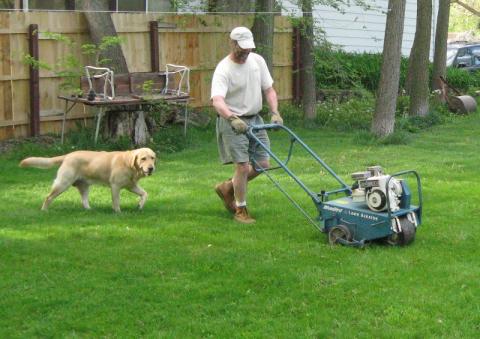
Now that it is spring many homeowners are starting to get ready to take on outdoor improvements. I have tilled a couple gardens already this year, a month ahead of when I usually do. Lawn care is another thing that is on many people's minds, I hope they choose wisely if they decide to apply fertilizers or pesticides.
A healthy lawn does not require continual treatments to be lush and healthy. Marketing has convinced many people to have regular applications though it is not required or even desired. Before deciding to use any fertilizers, having the soil tested is essential. A soil test will help you determine what, if any, nutrients would benefit lawn care. Too many and unnecessary fertilizer applications will get washed into the watershed creating problems in our lakes. Soil test are easy to do and are not very expensive, often offsetting the cost of the fertilizer. More often than not, balancing the pH will help your lawn the most.
Selective herbicides are another popular but unnecessary product. Properly maintained, a health lawn will reduce the ability of weeds to establish. Some "weeds" are very beneficial to the survival of the ecosystem. Dandelions are an example, they are one of the essential plants for bees. Bees are critical for pollinating fruit trees and other plants. Pesticides and herbicides have hurt the bee population significantly through the years. To me, a few yellow flowers in my lawn is a small price to pay for the welfare of the bees.
Proper lawn care starts by mowing at three or more inches. Turf grass thrives on a deep root zone that can only be achieved through proper mowing and occasional aeration. Core lawn aeration, especially in clay soils, help the root zone to expand and grow deeper. The ecosystem in the soil breaks down organic matter feeding the grass, not just on the surface like fertilizers do. Constant fertilizer applications will reduce the root zone because the turf grass does not need to go as deep to get nutrients, this make the lawn less drought tolerant requiring frequent watering in dry times.
As we all get out to start our spring lawn care, think wisely about your approach this year. Send a soil sample off to the extension service to see if you need to balance the pH or add any nutrients. Mow at 3" or more and do not cut off more than one third of the grass. Occasionally aerate ( do mine every year) especially if your lawn gets a lot of use or was established in poor soil conditions. If you get a few weeds remember that it takes a few years for your lawn to recover from constant and unnecessary fertilizer and herbicide applications. Like drug addictions in people, it takes time for the recovery process but in the long run you are better off and healthier.
- Log in to post comments
